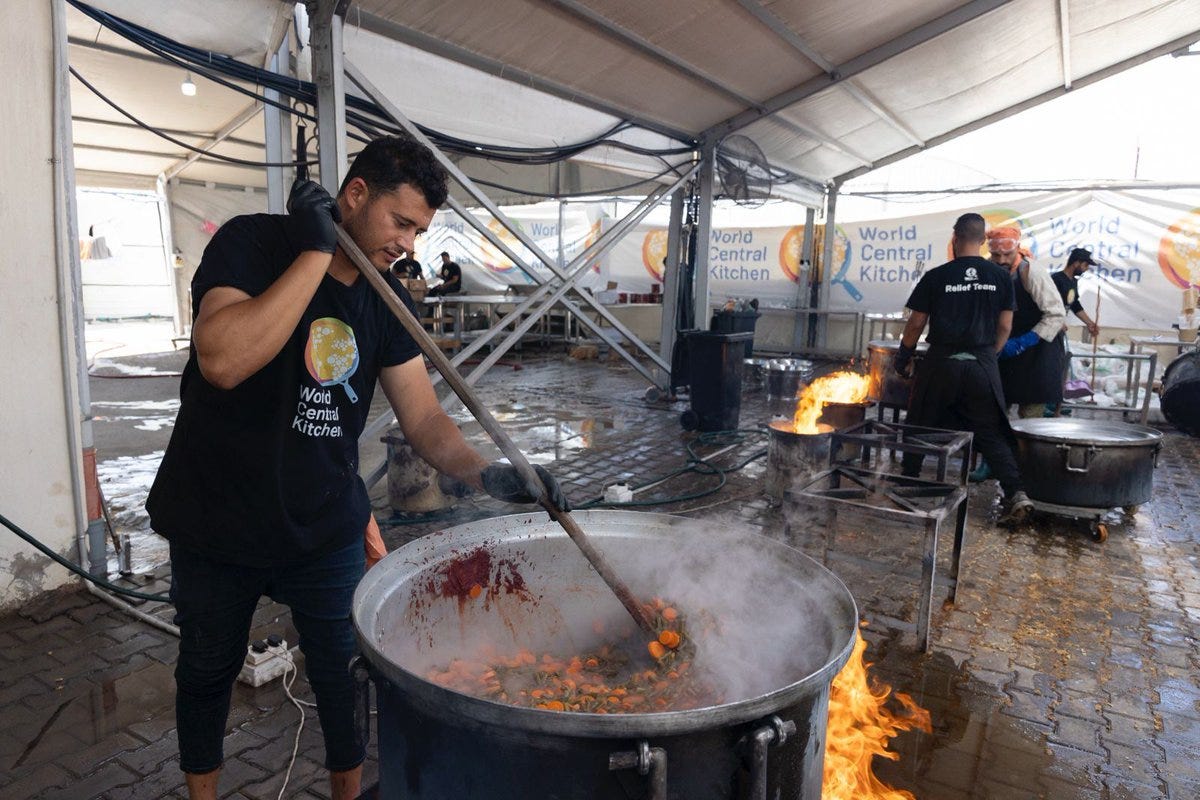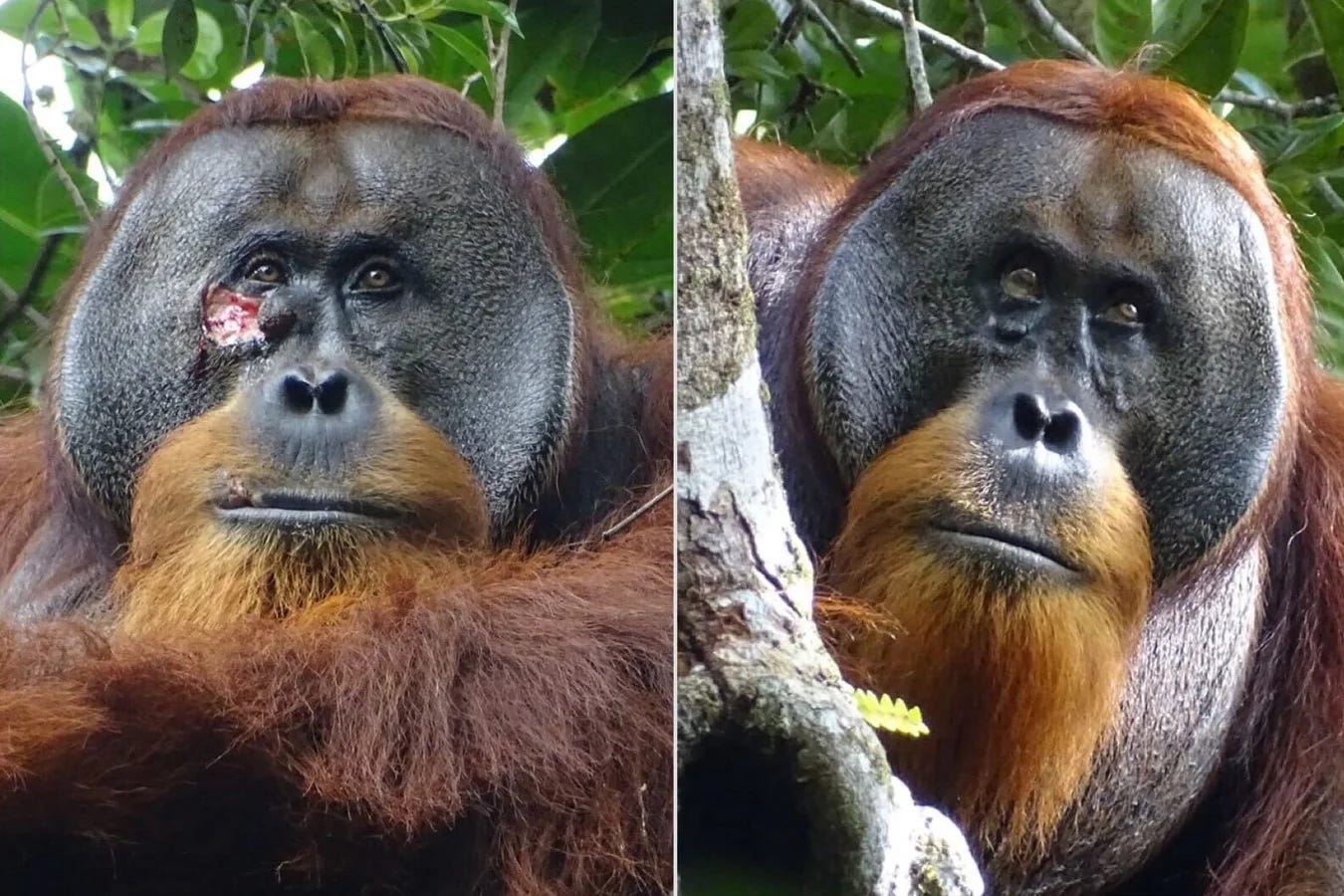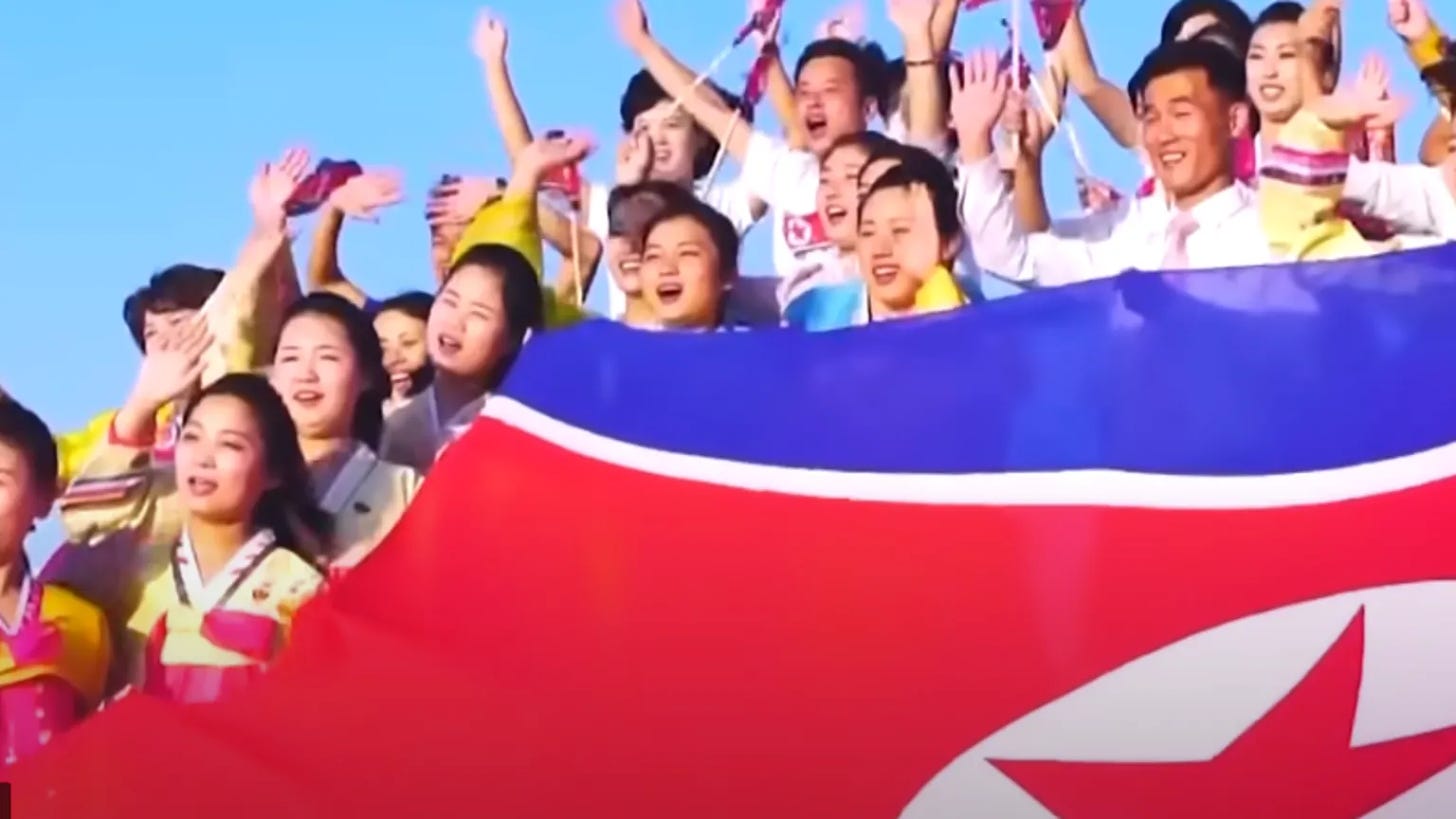The Cosmopolitics weekend edit
Student protests on Gaza go global. Plus Russia uses chemical weapons in Ukraine, China makes a space race play, and Kim Jong Un becomes a Tiktok influencer
I think we have all been rocked this week by colleges protests on college campuses across the country coming to a head and involvement law enforcement.
Now the protests are going global, encompassing broader issues like global warming, policing, and racial discrimination. Many of the protests have involved students occupying campuses, leading to clashes with university authorities and local law enforcement. The protesters often see the Gaza conflict as part of larger global structures of oppression.
Governments in various countries have reacted differently, ranging from supportive dialogues to law enforcement interventions. For example, in France, authorities have taken steps to suppress protests, while at some UK universities, students are pressing for divestment from companies linked to Israel.
In several countries, such as Australia, Lebanon, and Mexico, students are demanding their institutions cut ties with Israel and highlighting other social justice issues. Many pro-Palestinian protests have been met with counter-protests by pro-Israel groups, leading to heightened tensions on campuses. Regardless of the trajectory of the Gaza war, I think the broader global youth protest movement on a variety of social issues is going to intensify.
Related: Brown agrees to vote on Israel divestment: Brown University became the first university to agree to a key demand from pro-Palestinian protesters, allowing them to vote on divesting its holdings from Israel. This concession was part of an agreement to end student protests and clear an encampment from the campus. The university's president, Christina Paxson, confirmed that students will meet with Brown’s governing board to discuss divestment in May, with a vote scheduled for October. Here is how the Brown Daily Herald, the university’s student newspaper, wrote it
Israel-Gaza latest:
WFP: famine spreading in Gaza: World Food Program Executive Director Cindy McCain, believes there's a severe famine in northern Gaza that's spreading southward. In an interview with Kristen Welker airing Sunday on NBC's "Meet the Press," McCain said she feels that a "full-blown famine" is currently affecting Gaza, although the United Nations has only warned that famine is "imminent." In April, Samantha Power, the head of USAID, was the first U.S. official to consider famine possible in Gaza. McCain described the situation as "horror" and hopes for a ceasefire to expedite aid delivery.
Related: WCK restarts operations in Gaza:
World Central Kitchen, led by founder Jose Andres, resumed its operations in Gaza this week after a temporary halt following Israeli military strikes that killed seven of its staff members in April. The incident prompted widespread condemnation, and Israeli Prime Minister Benjamin Netanyahu offered rare public acknowledgment of responsibility, promising to investigate the "tragic incident." In an op-ed on Wednesday, Andres reflected on the difficulty of returning to Gaza after such a devastating event but underscored the organization's unwavering dedication to assisting those in need but called on Israeli forces to “step up.”
ICC warns against interference on Israel The International Criminal Court (ICC) issued a warning against external efforts to influence its actions, after reports that the court may consider arrest warrants for Israeli leaders, including Prime Minister Benjamin Netanyahu. This statement came amidst Israeli concerns, as the country views the ICC as a threat to its democratic sovereignty. Netanyahu has called on global leaders to prevent ICC actions against Israel, which does not recognize the court's jurisdiction. The ICC hasn't confirmed if it's pursuing warrants against Israeli leaders, but it urged outside interference to stop immediately. A bipartisan group of U.S. senators recently discussed potential ICC arrest warrants for Israeli officials and some U.S. senators have introduced legislation to sanction ICC officials who investigate U.S. allies like Israel, which does not recognize the court's jurisdiction.
Can China make peace among Palestinian factions? Fatah and Hamas, the two leading Palestinian factions discussed reconciliation during recent talks in Beijing, the Chinese foreign ministry said. The discussions, facilitated by China, aimed at fostering Palestinian unity and discussed the potential for a ceasefire and the humanitarian crisis in Gaza. The talks highlighted China's growing role in global diplomacy, as it seeks to get more involved in the Israeli-Palestinian conflict. Last year it mediated talks between arch enemies Saudi Arabia and Iran.
US sanctions Russia for using chemical weapons in Ukraine
The United States has accused Russia of violating international law by deploying chemical weapons as a "method of warfare" in Ukraine. The State Department says Russia utilized chloropicrin, a substance banned under the Chemical Weapons Convention, along with tear gas, in attacks against Ukrainian forces. These actions, if confirmed, would contravene the 1997 Chemical Weapons Convention, which Russia is a signatory to. The Kremlin has denied these allegations, calling them baseless and asserting adherence to the Chemical Weapons Convention. In response to these findings, the US announced sanctions against three state entities associated with Russia's chemical and biological weapons programs, as well as four supporting companies.
Related: They were promised jobs in Russia. They ended up fighting in Ukraine. NBC News releasngside the Russian military in its war against Ukraine. Some families, frustrated by what they say is a lack of support from the Indian government, say they feel they have no choice but to travel to Russian-occupied areas of Ukraine to get their loved ones back.
Related: Is Georgia taking cues from Russia? Georgia's Parliament has taken a significant step toward passing legislation aimed at regulating "foreign agents," sparking widespread protests and condemnation both domestically and internationally. The bill, reminiscent of similar laws in Russia, would require organizations and media outlets receiving more than 20% of their funding from abroad to register as "agents of foreign influence." Critics, including President Salome Zourabichvili, argue that the bill is a tool of foreign interference, backed by Russia, and designed to undermine Georgia's aspirations to join the European Union. Rights groups, including Human Rights Watch and Amnesty International, as well as the European Union and the United States, have condemned the legislation, cautioning that it may curtail fundamental freedoms and escalate persecution against dissenters. Protests against the bill have continued, with violent clashes between demonstrators and police resulting in injuries and arrests. President Zourabichvili has vowed to veto the law, but Georgian Dream holds enough parliamentary votes to override her veto.
China space race
China has launched an ambitious space mission aimed at collecting samples from the far side of the moon, a significant step in its space exploration agenda. The country plans to bring back the lunar samples to Earth within two months, marking a potential first for any nation. Thed this bombshell report about Indian workers who were lured to Russia with promises of jobs as cooks or housekeepers, only to find themselves forced to fight aloe far side of the moon, often called the "dark side," poses communication challenges, which China plans to address using its relay satellite system. The mission aligns with China's long-term goals, including landing astronauts on the moon by 2030 and establishing a lunar base. The space race between China and the U.S. is intensifying, with both nations seeking to secure their strategic interests beyond Earth. China's space ambitions are part of its broader rivalry with the United States, which also includes technological domains like computer chips and solar panels. While China has successfully conducted unmanned landings on the moon before, this mission aims to combine both lunar landing and sample retrieval.
Is Japan xenophobic? Biden says yes
Japan responded critically to President Biden's recent remarks characterizing the country as "xenophobic" like China and Russia. Biden's comments, made at a campaign event, linked economic struggles in Japan, China, Russia, and India to their reluctance to accept immigrants, contrasting this with the U.S. stance of welcoming immigrants as a boon to economic growth. Tokyo termed Biden's characterization "unfortunate" and based on a misunderstanding of Japan's policies, emphasizing that the country had already clarified its stance to the White House. The remarks were made shortly after Biden's high-level diplomacy with Japanese Prime Minister Fumio Kishida, which included a state dinner. The White House later toned down the comments, with National Security Council spokesman John Kirby framing them as part of a broader message about the U.S. being a nation of immigrants.
The famine you aren’t talking about
Escalating violence in Darfur, Sudan is exacerbating a dire hunger crisis, with many resorting to eating grass and peanut shells for survival, according to the World Food Program . The region has been ravaged by civil war since April 2023, with clashes between the Sudanese army and the paramilitary Rapid Support Forces resulting in widespread displacement and reports of atrocities. The recent killing of two International Committee of the Red Cross drivers highlights the dangers faced by humanitarian workers attempting to address the crisis. The situation in Darfur's capital, El Fasher, is particularly dire, with arbitrary killings, village burnings, and air bombardments intensifying. Despite efforts to deliver food assistance, aid convoys have been disrupted by the violence, leaving millions at risk of starvation. The conflict has displaced over 8.7 million people, including 4.6 million children.
Orangutan self-help
I love this story! An orangutan in Sumatra showcased remarkable self-medication behavior by using a medicinal plant to heal a wound. The orangutan, named Rakus, was observed using a plant called yellow root, known for its healing properties, to treat a facial injury. Scientists noted that Rakus chewed the plant, applied its juice to his wound, and then used the remnants to cover it up. His wound healed without infection within a month. Researchers highlighted that such behavior underscores the intelligence of animals in utilizing natural remedies.
North Korea’s new TikTok influencer
North Korean leader Kim Jong Un unexpectedly found his latest propaganda song going viral on TikTok, with users enthusiastically dancing to its catchy beats despite its sinister lyrics praising a leader known for hostile rhetoric and missile launches. The song, "Friendly Father," is part of a longstanding tradition of upbeat propaganda pop in North Korea, designed to embed ideological messages in the minds of listeners. Despite its sunny pop style, the song serves a darker purpose, promoting loyalty to the regime. Watch it at the BBC
WEEKEND FARE
📺 Watch On Nexflix: "Laapataa Ladies," is the accidental swapping of brides on a train journey leads to hilarious chaos and poignant self-discovery. When one man mistakenly brings home a stranger instead of his intended bride, it sets off a series of misadventures involving corrupt police, a bewildered wife in an unfamiliar town, and a determined woman with her own mysterious agenda. This comedic yet incisive story exposes the absurdity and violence of patriarchal customs in rural India, by blending humor, suspense and social critique in a delightful film.
🎙️ Listen: Return to Guantanamo: Serial and the New York Times return to the podcasting scene with a season focused on Guantánamo Bay. Delving into the personal experiences of detainees, guards, and other personnel, the season aims to provide a nuanced understanding of life inside the controversial facility. Through a series of short stories, Serial sheds light on the surreal aspects of Guantánamo, highlighting its normalization despite its egregious violations of international law.
📚 Read The Daughters of Kobani: A Story of Rebellion, Courage, and Justice is one of my favorite reads of the last few years. Gayle Tzemach Lemmon is a beautiful writer and offers this extraordinary account of the Kurdish militia's female fighters who played a pivotal role in combating ISIS in northeastern Syria and advocating for women's rights. Their bravery and determination not only helped defeat ISIS on the battlefield but also inspired broader social change in the Middle East and beyond by challenging stereotypes and proving women's leadership in war.
If you have any suggestions for books, films and shows or podcasts, please send them my way!
Thanks for reading. As always, please send me your thoughts, comments and questions.







